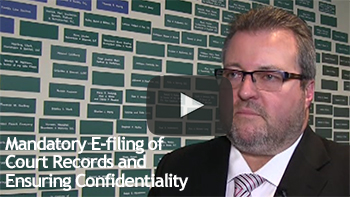Clarifying Interlocutory Appeals Procedures
 I write to offer two clarifications to the article “How to Appeal Mid-Litigation Decisions” (Wisconsin Lawyer, Dec. 2014). The article defines nonfinal orders that may be the subject of a petition for leave to appeal as “orders that do not dispose of all the claims as to all the parties.” This may be interpreted to mean that an order is not final unless it terminates the litigation as to all parties. In reality, there can be mid-litigation orders that may terminate the litigation as to one or more of the parties even though the litigation continues. Those orders are final and appealable as of right. See Wis. Stat. § 808.03(1). For example, in a case with one plaintiff and several defendants, an order dismissing one defendant will normally be final and appealable as to that defendant.
I write to offer two clarifications to the article “How to Appeal Mid-Litigation Decisions” (Wisconsin Lawyer, Dec. 2014). The article defines nonfinal orders that may be the subject of a petition for leave to appeal as “orders that do not dispose of all the claims as to all the parties.” This may be interpreted to mean that an order is not final unless it terminates the litigation as to all parties. In reality, there can be mid-litigation orders that may terminate the litigation as to one or more of the parties even though the litigation continues. Those orders are final and appealable as of right. See Wis. Stat. § 808.03(1). For example, in a case with one plaintiff and several defendants, an order dismissing one defendant will normally be final and appealable as to that defendant.
The article correctly states that while an interlocutory appeal is pending in the court of appeals, trial court proceedings are not automatically stayed. The article suggests that temporary relief “pending the conclusion of the interlocutory appeal” can be sought under Wis. Stat. Rule 809.52. However, Rule 809.52 authorizes temporary relief only while the petition for leave to appeal is pending. If the petition is granted, an appeal is then commenced and a party needs to seek relief pending appeal under Wis. Stat. Rule 809.12, which requires a motion in the trial court first, unless it is impractical to seek relief in the trial court.
Atty. Jennifer Andrews
Chief Staff Attorney
Wisconsin Court of Appeals, Madison
Response: This clarification from the Court of Appeals is both helpful and appreciated. Thank you!
Atty. Kimberly L. Alderman
Alderman Law Firm, Madison
More Practice Tips from A to Z: Take Time Out
Mike Guerin’s not that old. But his suggestions in “The Practice of Law from A to Z: A View From an Old Guy” (Wisconsin Lawyer, Jan. 2015) resonate. As an even older guy, I would add a second “T” to his valuable list: Time out.
 I moved my practice from Milwaukee to Appleton in 1972 and soon discovered the Y had open adult swimming from 11 a.m. until 3 p.m. As a high school swimmer who hadn’t been near a pool in 20 years, I wanted to get back in the water. The pool was convenient. I wanted to get back in the swim.
I moved my practice from Milwaukee to Appleton in 1972 and soon discovered the Y had open adult swimming from 11 a.m. until 3 p.m. As a high school swimmer who hadn’t been near a pool in 20 years, I wanted to get back in the water. The pool was convenient. I wanted to get back in the swim.
After a few weeks of almost daily lap swims, one day I told my secretary, “The 90 minutes between about noon and 1:30 are mine. Unless it’s Judge X on the phone demanding my immediate presence, there’ll be no appointments during ‘my time.’”
Over the years I was able to pretty much stick to that schedule. And the result, I like to think, was that I was putting in a more productive work day on behalf of my clients.
For example, after an hour or so negotiating with a “difficult” lawyer or battling in a court room, one hour of hard swimming took the edge off the tension that had built up. I drowned the stress in a mile of hard freestyle and went back to the office or courtroom feeling refreshed. And there was another benefit: One day after a hard swim, I pulled up at the end of the pool and said to a friend in the next lane, “I’ve got to quit smoking.” And I did that same afternoon, cold turkey, just like that. Fifty years without a cigarette thanks to 60 minutes in the pool.
So, my suggestion is: During your work day, try to find at least 30 minutes of down time recreation. If possible, make it strenuous. Get out of breath. Count laps or reps or steps or miles but not billable hours. You’ll be ready to do your client’s business and you might just live long enough to become an “old guy” like Mike – and me.
Atty. Robert (Bob) Swain Jr.
Robert W. Swain Attorney at Law, Appleton
How Do You Get People to Change?
 I found the article “Organizational Culture: Predicting a Law Firm’s Success” very interesting (Wisconsin Lawyer, Nov. 2014). The question of how you get people to change given the law firm culture is a constant preoccupation of mine. It hinders everything from adoption of new technologies and business operations to just being conscious about and thinking outside of the box in the way that you work. The article was also very well placed in the issue featuring innovation.
I found the article “Organizational Culture: Predicting a Law Firm’s Success” very interesting (Wisconsin Lawyer, Nov. 2014). The question of how you get people to change given the law firm culture is a constant preoccupation of mine. It hinders everything from adoption of new technologies and business operations to just being conscious about and thinking outside of the box in the way that you work. The article was also very well placed in the issue featuring innovation.
Atty. Jacquie Champagne
General Counsel/Business Development Executive
Legal Placement Services – Contract Counsel Solutions
Another Nice Issue
 I make it a habit to read my copy of Wisconsin Lawyer magazine upon receipt in the mail. The magazine always contains informative and interesting articles. I particularly enjoyed reading the article from Past President Mike Guerin, the Douglas Abrams article suggesting ways to overcome bad writing habits, and the work/life balance article written by Steven Haught (Wisconsin Lawyer, Jan. 2015).
I make it a habit to read my copy of Wisconsin Lawyer magazine upon receipt in the mail. The magazine always contains informative and interesting articles. I particularly enjoyed reading the article from Past President Mike Guerin, the Douglas Abrams article suggesting ways to overcome bad writing habits, and the work/life balance article written by Steven Haught (Wisconsin Lawyer, Jan. 2015).
Another excellent issue from the editorial team.
Dwight Dinkla
Executive Director, Iowa State Bar Association, Des Moines, Iowa
Here’s What You May Have Missed
Not connecting with us online? This month we highlight readers’ comments posted to online articles. Let’s hear what you have to say. Post comments to WisBar News, InsideTrack, and Wisconsin Lawyer articles or respond to Facebook, LinkedIn, and Twitter posts. Or simply email the editors at wislawmag@wisbar.org.
Bitcoins are Taxed as “Property,” Says the IRS
In “What Lawyers Need to Know About Bitcoins” (Wisconsin Lawyer, Jan. 2015), authors Sharon Nelson and John Simek explained this digital currency and discussed the benefits and risks of accepting bitcoins as legal fees. A reader provides a tax perspective.
 WL Online: The fact that the IRS has ruled that virtual currencies are property, not money, has several implications. Individuals or businesses that create virtual currencies (by “mining”) have ordinary income equal to the fair market value of the currencies when received. Individuals or businesses accepting virtual currencies in payment for goods or services must include in income their fair market value when received. Individuals or businesses that pay for goods or services with virtual currencies will have a gain or loss equal to the difference between the fair market value of the property or services received and their tax basis in the virtual currency used to pay for the property or services. The gain or loss will be short-term or long-term depending on when the currency was acquired.
WL Online: The fact that the IRS has ruled that virtual currencies are property, not money, has several implications. Individuals or businesses that create virtual currencies (by “mining”) have ordinary income equal to the fair market value of the currencies when received. Individuals or businesses accepting virtual currencies in payment for goods or services must include in income their fair market value when received. Individuals or businesses that pay for goods or services with virtual currencies will have a gain or loss equal to the difference between the fair market value of the property or services received and their tax basis in the virtual currency used to pay for the property or services. The gain or loss will be short-term or long-term depending on when the currency was acquired.
The normal information reporting rules apply. So if you hire a self-employed painter to paint your business office and pay her with a virtual currency, you must issue Form 1099-MISC to report the payment unless one of the normal exceptions applies. If you engage in transactions using virtual currencies, you need to identify the types of virtual currency transactions you engage in. Then you need to implement a system to record those transactions, including the date acquired, fair market value when acquired, the date disposed of, and the value of the goods or services received in exchange. Such a system will capture the information needed to be included in your income tax return and will help identify those transactions subject to information reporting.
Atty. Steven C. Feurer
Petition for Mandatory E-filing in Circuit Courts Prompts Give-and-Take
 Representing the Committee of Chief Judges, Jefferson County Circuit Court Judge Randy Koschnick appeared before the State Bar Board of Governors in December to urge support for a petition to make e-filing of court documents mandatory in Wisconsin. The petition was submitted to the Wisconsin Supreme Court in October and is scheduled for a public hearing on March 17, 2015, at 2 p.m.
Representing the Committee of Chief Judges, Jefferson County Circuit Court Judge Randy Koschnick appeared before the State Bar Board of Governors in December to urge support for a petition to make e-filing of court documents mandatory in Wisconsin. The petition was submitted to the Wisconsin Supreme Court in October and is scheduled for a public hearing on March 17, 2015, at 2 p.m.
Legal writer Joe Forward’s video interview with Judge Koschnick appeared with the Jan. 21, 2015, issue of InsideTrack and elicited some reader and viewer give-and-take.
WIT Online: “We’re simply trying to implement a system that will allow us to do things electronically, rather than on paper,” says Judge Randy Koschnick of the petition to make e-filing of court documents mandatory in Wisconsin.
Allow = Mandatory. Wow!
“We’ll implement it on a county-by-county basis taking the counties that are interested in implementing it first.” Hasn’t that been tried? Haven’t the counties already had a chance to express their interest, which is why this proposal is to mandate a system that has not been accepted voluntarily at the county level?
How to Submit Letters to the Editor
Wisconsin Lawyer provides a forum for members to express ideas, concerns, and opinions on law-related subjects. Limit to 500 words; writing guidelines available. Submit to Wisconsin Lawyer “Letters,” P.O. Box 7158, Madison, WI 53707-7158; or wislawyer@wisbar.org (include “Letters” in the subject line).
Finally, why did the clerks of the Eastern and Western District bankruptcy courts – who administer an electronic filing system that works – say that they have had no contact from the state pushers of mandatory e-filing?
Atty. John Gallo
Houseman & Feind LLP, Grafton
Response: The Chief Judge E-filing Subcommittee did a site visit to the Western Wisconsin Federal District Court, which included a meeting with a U.S. Magistrate Judge and several members of the court support staff. They were unanimous and enthusiastic in their support of their e-filing system and told us that the bar had welcomed its implementation as well. My understanding is that the entire U.S. federal court system now has mandatory e-filing, so the concept of a system-wide mandatory rule is nothing new.
In addition, the Wisconsin Supreme Court and Court of Appeals also require lawyers to file briefs and several other types of documents electronically. In my public outreach efforts concerning mandatory e-filing in Wisconsin circuit courts, the responses have been overwhelmingly positive and encouraging. We do appreciate comments, whether positive or negative, so that the Wisconsin Supreme Court has as much public input as possible prior to considering this proposal.
Judge Randy Koschnick
Jefferson County Circuit Court, Jefferson
WIT Online: A terrible idea for basically confidential information in all family law cases, guardianships, conservatorships, etc., including Children’s Court, paternity, adoptions, and so on. There are some things that should not be openly accessible to the world. It may be convenient for general civil cases, but not the above and not criminal.
Atty. Mary H. Payne
Mary H. Payne Law Office, Milwaukee
Response: The proposed e-filing system will provide the same, if not greater, confidentiality. E-filed cases will only be viewable online by a party to the case, not the general public. If a non-party wishes to view a file available to the public, the person would be required to go to the courthouse and use the public access terminals available in the clerk of courts office. All case types currently confidential under law would continue to be confidential.
Parties would be required to exclude certain information such as personal identifiers (Social Security, driver’s license, and passport numbers and financial account numbers) from e-filed documents. Parties must identify information made confidential by statute and case law.
A list of commonly filed documents that are required by law to be confidential will be available from the clerk or on the court’s website. This would include confidential case types such as mental commitments, child protection, and juvenile delinquency, as well as documents such as a financial disclosure in a divorce or a presentence investigation report in a criminal matter. In addition, a party may file a document with a motion requesting it be confidential, and it remains confidential until the court rules or the parties stipulate.
Thus, the proposed system provides the same level of confidentiality as the current paper system and, in fact, goes an extra step by (for the first time) codifying the method to seal a document and requiring the filer to exclude certain personal identifiers.
Judge Gerald P. Ptacek
Racine County Circuit Court, Racine
Good Advice If You’re Ever Pulled Over
In “Protecting Your Rights: What to Do When Pulled Over in Wisconsin” (InsideTrack, Jan. 7, 2015), author Eric Hunt says traffic stops are the most common contact that people will have with police. Yet many people, including lawyers, don’t fully understand their rights in these circumstances. In this article, the author breaks down the basics on traffic stop rights. A reader offers other good advice.
 IT Online: Thank you. Spot on, counselor. If I may also suggest that, when asked to provide identification kept in your wallet in your trouser pocket, one should first tell the officer that you will need to reach into your trouser pocket (or wherever you need to reach) to slowly retrieve same. The officer will appreciate that information and watch you closely. (Most likely with his or her hand on a holstered weapon.) This might save you the fright of having the officer suddenly drawing a weapon and leveling it at you because the officer suspects you are retrieving a weapon.
IT Online: Thank you. Spot on, counselor. If I may also suggest that, when asked to provide identification kept in your wallet in your trouser pocket, one should first tell the officer that you will need to reach into your trouser pocket (or wherever you need to reach) to slowly retrieve same. The officer will appreciate that information and watch you closely. (Most likely with his or her hand on a holstered weapon.) This might save you the fright of having the officer suddenly drawing a weapon and leveling it at you because the officer suspects you are retrieving a weapon.
Atty. Steve Kaminski
Kaminski Law Offices, Milwaukee
Response: Yes indeed. While I didn’t capture every situation, like the wallet example, in this article, it is always a good idea when interacting with law enforcement in a seizure or stop situation to forecast what you are going to do before you do it. Doing so should put the officer more at ease and reduce the likelihood of escalation.
Eric Hunt
Axley Brynelson LLP, Madison
